人教版英语九年级 Unit10 You're supposed to shake hands. SectionB 2a-2e 课件(共15张PPT)
文档属性
| 名称 | 人教版英语九年级 Unit10 You're supposed to shake hands. SectionB 2a-2e 课件(共15张PPT) | 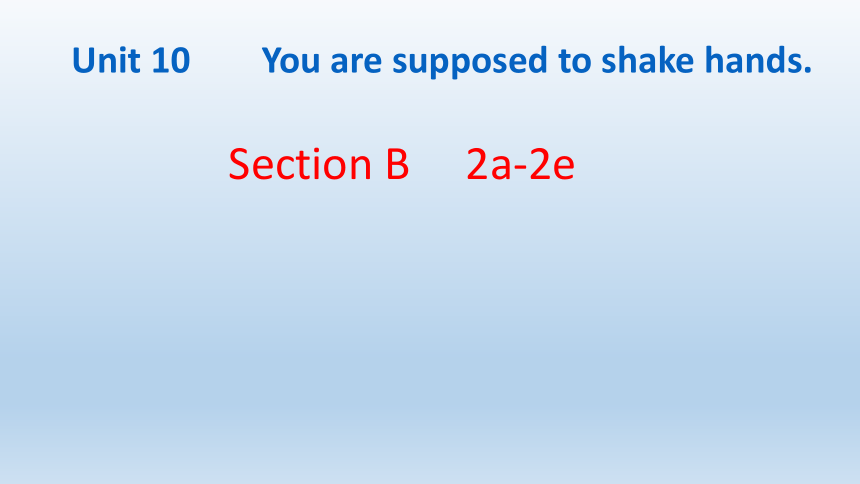 | |
| 格式 | zip | ||
| 文件大小 | 147.8KB | ||
| 资源类型 | 教案 | ||
| 版本资源 | 人教新目标(Go for it)版 | ||
| 科目 | 英语 | ||
| 更新时间 | 2020-12-23 22:00:06 | ||
图片预览

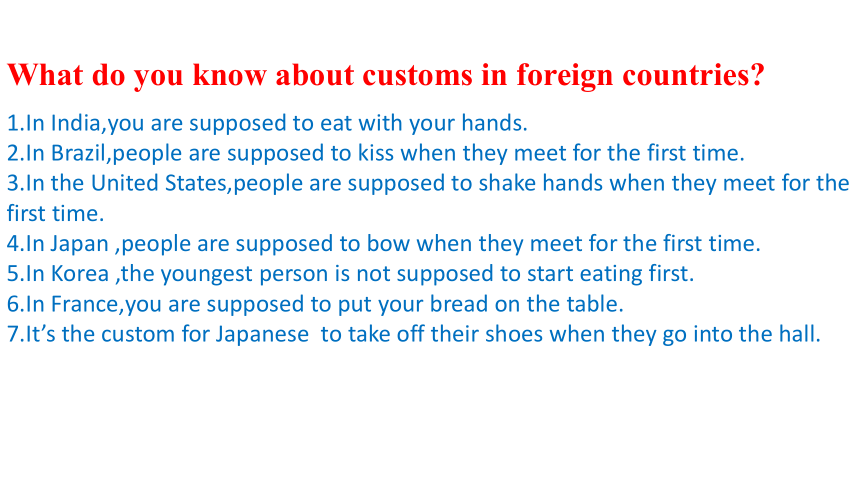
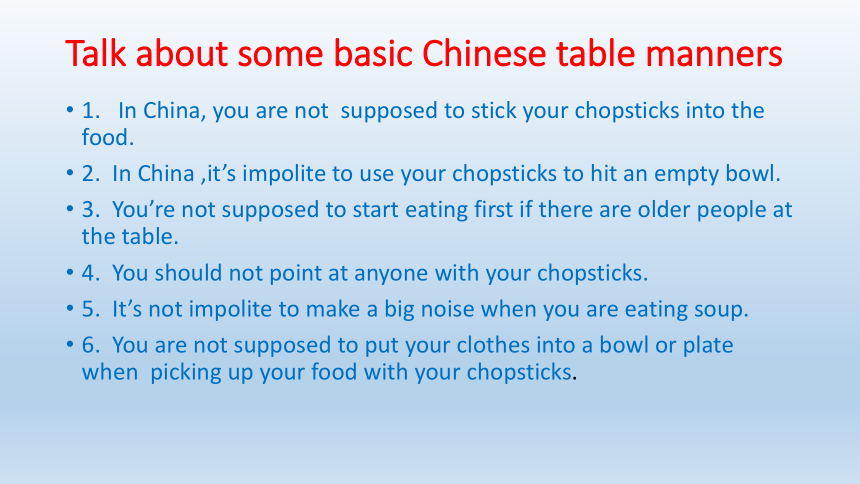
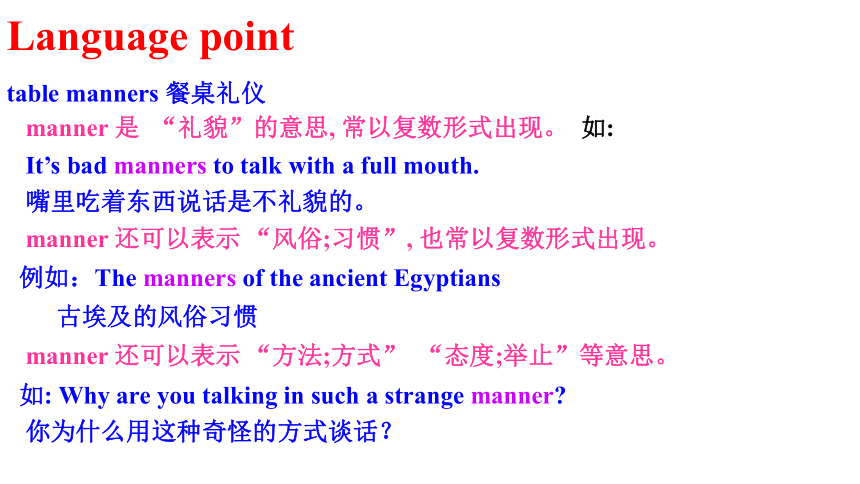
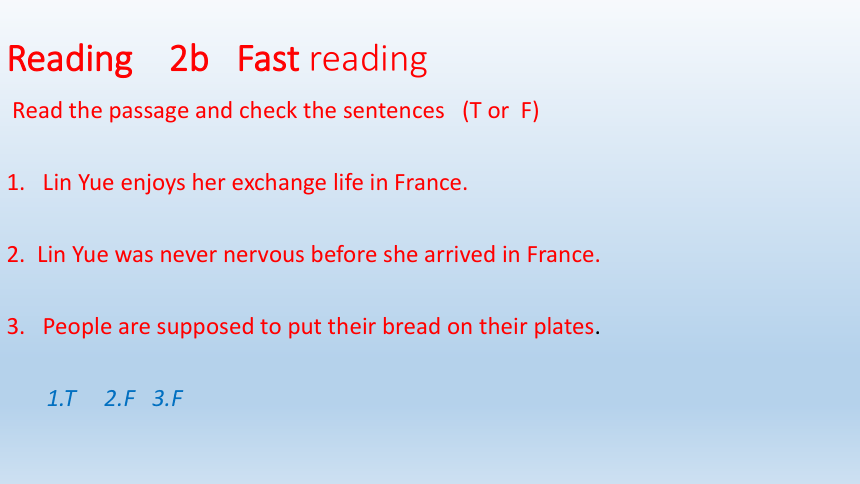
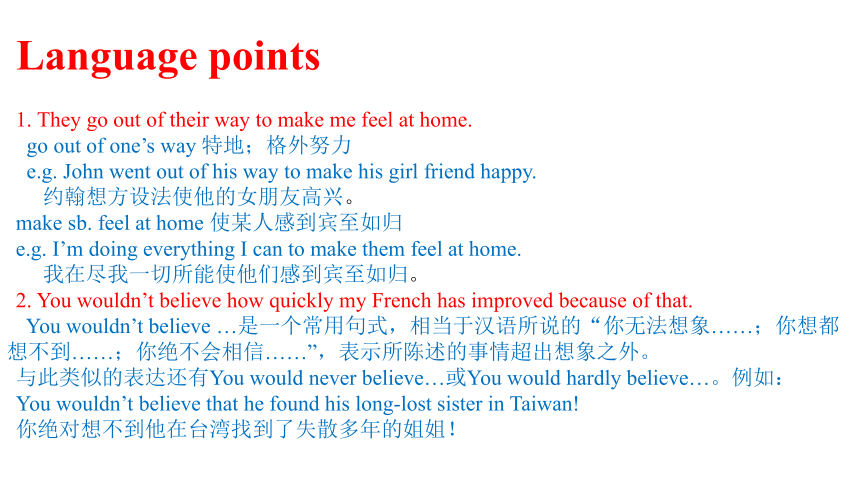
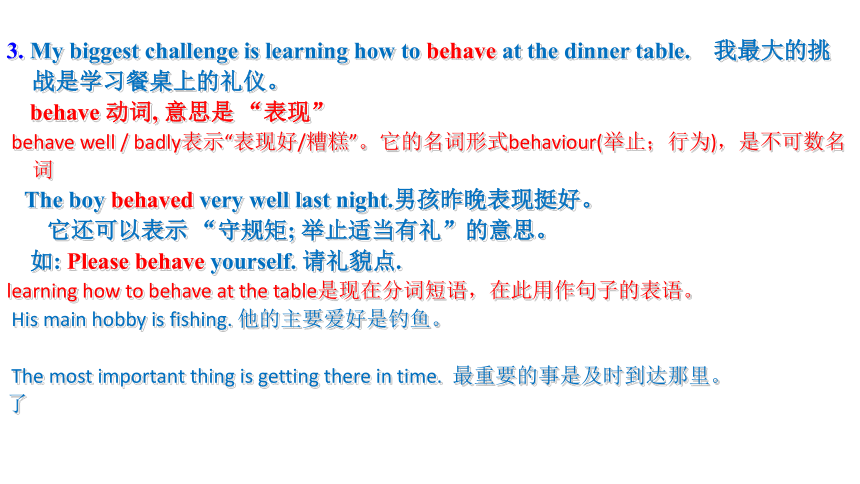
文档简介
(共15张PPT)
Unit
10
You
are
supposed
to
shake
hands.
Section
B
2a-2e
1.In
India,you
are
supposed
to
eat
with
your
hands.
2.In
Brazil,people
are
supposed
to
kiss
when
they
meet
for
the
first
time.
3.In
the
United
States,people
are
supposed
to
shake
hands
when
they
meet
for
the
first
time.
4.In
Japan
,people
are
supposed
to
bow
when
they
meet
for
the
first
time.
5.In
Korea
,the
youngest
person
is
not
supposed
to
start
eating
first.
6.In
France,you
are
supposed
to
put
your
bread
on
the
table.
7.It’s
the
custom
for
Japanese
to
take
off
their
shoes
when
they
go
into
the
hall.
What
do
you
know
about
customs
in
foreign
countries?
Talk
about
some
basic
Chinese
table
manners
1.
In
China,
you
are
not
supposed
to
stick
your
chopsticks
into
the
food.
2.
In
China
,it’s
impolite
to
use
your
chopsticks
to
hit
an
empty
bowl.
3.
You’re
not
supposed
to
start
eating
first
if
there
are
older
people
at
the
table.
4.
You
should
not
point
at
anyone
with
your
chopsticks.
5.
It’s
not
impolite
to
make
a
big
noise
when
you
are
eating
soup.
6.
You
are
not
supposed
to
put
your
clothes
into
a
bowl
or
plate
when
picking
up
your
food
with
your
chopsticks.
Language
point
table
manners
餐桌礼仪
manner
是
“礼貌”的意思,
常以复数形式出现。
如:
It’s
bad
manners
to
talk
with
a
full
mouth.
嘴里吃着东西说话是不礼貌的。
manner
还可以表示
“风俗;习惯”,
也常以复数形式出现。
例如:The
manners
of
the
ancient
Egyptians
古埃及的风俗习惯
manner
还可以表示
“方法;方式”
“态度;举止”等意思。
如:
Why
are
you
talking
in
such
a
strange
manner?
你为什么用这种奇怪的方式谈话?
Reading
2b
Fast
reading
Read
the
passage
and
check
the
sentences
(T
or
F)
Lin
Yue
enjoys
her
exchange
life
in
France.
2.
Lin
Yue
was
never
nervous
before
she
arrived
in
France.
People
are
supposed
to
put
their
bread
on
their
plates.
1.T
2.F
3.F
Language
points
1.
They
go
out
of
their
way
to
make
me
feel
at
home.
go
out
of
one’s
way
特地;格外努力
e.g.
John
went
out
of
his
way
to
make
his
girl
friend
happy.
约翰想方设法使他的女朋友高兴。
make
sb.
feel
at
home
使某人感到宾至如归
e.g.
I’m
doing
everything
I
can
to
make
them
feel
at
home.
我在尽我一切所能使他们感到宾至如归。
2.
You
wouldn’t
believe
how
quickly
my
French
has
improved
because
of
that.
You
wouldn’t
believe
…是一个常用句式,相当于汉语所说的“你无法想象……;你想都想不到……;你绝不会相信……”,表示所陈述的事情超出想象之外。
与此类似的表达还有You
would
never
believe…或You
would
hardly
believe…。例如:
You
wouldn’t
believe
that
he
found
his
long-lost
sister
in
Taiwan!
你绝对想不到他在台湾找到了失散多年的姐姐!
3.
My
biggest
challenge
is
learning
how
to
behave
at
the
dinner
table.
我最大的挑战是学习餐桌上的礼仪。
behave
动词,
意思是
“表现”
behave
well
/
badly表示“表现好/糟糕”。它的名词形式behaviour(举止;行为),是不可数名词
The
boy
behaved
very
well
last
night.男孩昨晚表现挺好。
它还可以表示
“守规矩;
举止适当有礼”的意思。
如:
Please
behave
yourself.
请礼貌点.
learning
how
to
behave
at
the
table是现在分词短语,在此用作句子的表语。
His
main
hobby
is
fishing.
他的主要爱好是钓鱼。
The
most
important
thing
is
getting
there
in
time.
最重要的事是及时到达那里。
了
4....but
I
am
used
to
it.
词组
get/be
used
to
意思是
“习惯于……”词组中的
to
是介词
其后如果跟动词,动词应该用动名词形式。
辨析:
be/get
used
to
sth./doing
sth.
习惯于…
e.g.①
He
got
used
to
living
in
the
country.
他习惯住在乡下
②
She
gets
used
to
driving
a
small
car.
她习惯开一辆小车。
③She
will
get
used
to
getting
up
early.
她将习惯于早起。
used
to
do
sth.
过去常常做某事(现在不做了)
e.g.
He
used
to
plant
roses.
他过去常常种植玫瑰。
5.
Another
example
is
that
you’re
not
supposed
to
eat
anything
with
your
hand
except
bread,
not
even
fruit.
except作介词,意为“除……之外”,和but意义相似,但语气上要比but更加强烈。
①Everyone
is
here
except
him.
②We
have
classes
except
Saturday
and
Sunday.
Reading
2b
Careful
reading
2b
Read
the
letter
and
answer
the
questions.
1.
Why
is
Lin
Yue
in
France?
She
is
an
exchange
student.
2.
Does
she
enjoy
staying
with
her
host
family?
How
do
you
know?
Yes,
she
does.
Because
they
go
out
of
their
way
to
make
her
feel
at
home.
3.
How
does
she
feel
about
making
mistakes
when
she
speaks
French?
It
doesn't
worry
her
as
it
used
to.
4.
What
is
the
biggest
challenge
she
is
facing?
Learning
how
to
behave
at
the
dinner
table.
Reading
strategies(阅读策略)
--—Reviewing(复习)
Taking
notes
or
summarizing
the
main
ideas
Can
help
you
move
language
from
your
short-term
to
long-term
memory.
(做笔记或总结主要观点可以帮助你将语言的短期记忆变为长期记忆。)
Dos
Don’ts
You’re
expected
to
put
your
bread
on
the
table.
You’re
not
supposed
to
put
your
bread
on
your
plate.
Post
reading
Review
the
passage
and
make
notes
about
French
customs
in
the
chart.
You
are
not
supposed
to
eat
anything
with
your
hands
except
bread,
not
even
fruit.
You
are
supposed
to
say,
“That
was
delicious.”
if
you
don't
want
any
more
food.
You
are
not
supposed
to
say
you
are
full.
You
are
not
supposed
to
put
your
elbows
on
the
table.
You
are
supposed
to
cut
up
the
food
and
eat
it
with
a
fork.
1.
Making
mistakes
in
French
used
to
make
Lin
Yue
nervous.
2.
It
was
quite
hard
for
her
to
feel
good
about
speaking
French.
3.
The
host
family
tried
very
hard
to
help
Lin
Yue.
4.
Lin
Yue
has
slowly
learned
how
to
be
like
her
French
friends.
2c
Read
the
sentences
and
replace
the
underlined
words
with
the
phrases
in
the
box.
went
out
of
their
way,
be
comfortable
(doing)
gradually
gotten
used
to
being,
(something)
worry
(someone)
be
comfortable
worry
went
out
of
their
way
gradually
gotten
used
to
being
Homework
Compare
the
table
manners
in
France
and
China
in
your
group.
How
are
they
the
same
or
different?
Make
a
list.
Eg.
In
France,
people
put
their
bread
on
the
table.
But
in
China,
we
always
put
our
food
on
a
plate
or
in
a
bowl.
We
never
put
food
on
the
table.
Unit
10
You
are
supposed
to
shake
hands.
Section
B
2a-2e
1.In
India,you
are
supposed
to
eat
with
your
hands.
2.In
Brazil,people
are
supposed
to
kiss
when
they
meet
for
the
first
time.
3.In
the
United
States,people
are
supposed
to
shake
hands
when
they
meet
for
the
first
time.
4.In
Japan
,people
are
supposed
to
bow
when
they
meet
for
the
first
time.
5.In
Korea
,the
youngest
person
is
not
supposed
to
start
eating
first.
6.In
France,you
are
supposed
to
put
your
bread
on
the
table.
7.It’s
the
custom
for
Japanese
to
take
off
their
shoes
when
they
go
into
the
hall.
What
do
you
know
about
customs
in
foreign
countries?
Talk
about
some
basic
Chinese
table
manners
1.
In
China,
you
are
not
supposed
to
stick
your
chopsticks
into
the
food.
2.
In
China
,it’s
impolite
to
use
your
chopsticks
to
hit
an
empty
bowl.
3.
You’re
not
supposed
to
start
eating
first
if
there
are
older
people
at
the
table.
4.
You
should
not
point
at
anyone
with
your
chopsticks.
5.
It’s
not
impolite
to
make
a
big
noise
when
you
are
eating
soup.
6.
You
are
not
supposed
to
put
your
clothes
into
a
bowl
or
plate
when
picking
up
your
food
with
your
chopsticks.
Language
point
table
manners
餐桌礼仪
manner
是
“礼貌”的意思,
常以复数形式出现。
如:
It’s
bad
manners
to
talk
with
a
full
mouth.
嘴里吃着东西说话是不礼貌的。
manner
还可以表示
“风俗;习惯”,
也常以复数形式出现。
例如:The
manners
of
the
ancient
Egyptians
古埃及的风俗习惯
manner
还可以表示
“方法;方式”
“态度;举止”等意思。
如:
Why
are
you
talking
in
such
a
strange
manner?
你为什么用这种奇怪的方式谈话?
Reading
2b
Fast
reading
Read
the
passage
and
check
the
sentences
(T
or
F)
Lin
Yue
enjoys
her
exchange
life
in
France.
2.
Lin
Yue
was
never
nervous
before
she
arrived
in
France.
People
are
supposed
to
put
their
bread
on
their
plates.
1.T
2.F
3.F
Language
points
1.
They
go
out
of
their
way
to
make
me
feel
at
home.
go
out
of
one’s
way
特地;格外努力
e.g.
John
went
out
of
his
way
to
make
his
girl
friend
happy.
约翰想方设法使他的女朋友高兴。
make
sb.
feel
at
home
使某人感到宾至如归
e.g.
I’m
doing
everything
I
can
to
make
them
feel
at
home.
我在尽我一切所能使他们感到宾至如归。
2.
You
wouldn’t
believe
how
quickly
my
French
has
improved
because
of
that.
You
wouldn’t
believe
…是一个常用句式,相当于汉语所说的“你无法想象……;你想都想不到……;你绝不会相信……”,表示所陈述的事情超出想象之外。
与此类似的表达还有You
would
never
believe…或You
would
hardly
believe…。例如:
You
wouldn’t
believe
that
he
found
his
long-lost
sister
in
Taiwan!
你绝对想不到他在台湾找到了失散多年的姐姐!
3.
My
biggest
challenge
is
learning
how
to
behave
at
the
dinner
table.
我最大的挑战是学习餐桌上的礼仪。
behave
动词,
意思是
“表现”
behave
well
/
badly表示“表现好/糟糕”。它的名词形式behaviour(举止;行为),是不可数名词
The
boy
behaved
very
well
last
night.男孩昨晚表现挺好。
它还可以表示
“守规矩;
举止适当有礼”的意思。
如:
Please
behave
yourself.
请礼貌点.
learning
how
to
behave
at
the
table是现在分词短语,在此用作句子的表语。
His
main
hobby
is
fishing.
他的主要爱好是钓鱼。
The
most
important
thing
is
getting
there
in
time.
最重要的事是及时到达那里。
了
4....but
I
am
used
to
it.
词组
get/be
used
to
意思是
“习惯于……”词组中的
to
是介词
其后如果跟动词,动词应该用动名词形式。
辨析:
be/get
used
to
sth./doing
sth.
习惯于…
e.g.①
He
got
used
to
living
in
the
country.
他习惯住在乡下
②
She
gets
used
to
driving
a
small
car.
她习惯开一辆小车。
③She
will
get
used
to
getting
up
early.
她将习惯于早起。
used
to
do
sth.
过去常常做某事(现在不做了)
e.g.
He
used
to
plant
roses.
他过去常常种植玫瑰。
5.
Another
example
is
that
you’re
not
supposed
to
eat
anything
with
your
hand
except
bread,
not
even
fruit.
except作介词,意为“除……之外”,和but意义相似,但语气上要比but更加强烈。
①Everyone
is
here
except
him.
②We
have
classes
except
Saturday
and
Sunday.
Reading
2b
Careful
reading
2b
Read
the
letter
and
answer
the
questions.
1.
Why
is
Lin
Yue
in
France?
She
is
an
exchange
student.
2.
Does
she
enjoy
staying
with
her
host
family?
How
do
you
know?
Yes,
she
does.
Because
they
go
out
of
their
way
to
make
her
feel
at
home.
3.
How
does
she
feel
about
making
mistakes
when
she
speaks
French?
It
doesn't
worry
her
as
it
used
to.
4.
What
is
the
biggest
challenge
she
is
facing?
Learning
how
to
behave
at
the
dinner
table.
Reading
strategies(阅读策略)
--—Reviewing(复习)
Taking
notes
or
summarizing
the
main
ideas
Can
help
you
move
language
from
your
short-term
to
long-term
memory.
(做笔记或总结主要观点可以帮助你将语言的短期记忆变为长期记忆。)
Dos
Don’ts
You’re
expected
to
put
your
bread
on
the
table.
You’re
not
supposed
to
put
your
bread
on
your
plate.
Post
reading
Review
the
passage
and
make
notes
about
French
customs
in
the
chart.
You
are
not
supposed
to
eat
anything
with
your
hands
except
bread,
not
even
fruit.
You
are
supposed
to
say,
“That
was
delicious.”
if
you
don't
want
any
more
food.
You
are
not
supposed
to
say
you
are
full.
You
are
not
supposed
to
put
your
elbows
on
the
table.
You
are
supposed
to
cut
up
the
food
and
eat
it
with
a
fork.
1.
Making
mistakes
in
French
used
to
make
Lin
Yue
nervous.
2.
It
was
quite
hard
for
her
to
feel
good
about
speaking
French.
3.
The
host
family
tried
very
hard
to
help
Lin
Yue.
4.
Lin
Yue
has
slowly
learned
how
to
be
like
her
French
friends.
2c
Read
the
sentences
and
replace
the
underlined
words
with
the
phrases
in
the
box.
went
out
of
their
way,
be
comfortable
(doing)
gradually
gotten
used
to
being,
(something)
worry
(someone)
be
comfortable
worry
went
out
of
their
way
gradually
gotten
used
to
being
Homework
Compare
the
table
manners
in
France
and
China
in
your
group.
How
are
they
the
same
or
different?
Make
a
list.
Eg.
In
France,
people
put
their
bread
on
the
table.
But
in
China,
we
always
put
our
food
on
a
plate
or
in
a
bowl.
We
never
put
food
on
the
table.
同课章节目录
- Unit 1 How can we become good learners.
- Section A
- Section B
- Unit 2 I think that mooncakes are delicious!
- Section A
- Section B
- Unit 3 Could you please tell me where the restroom
- Section A
- Section B
- Unit 4 I used to be afraid of the dark.
- Section A
- Section B
- Unit 5 What are the shirts made of?
- Section A
- Section B
- Review of Units 1-5
- Unit 6 When was it invented?
- Section A
- Section B
- Unit 7 Teenagers should be allowed to choose their
- Section A
- Section B
- Unit 8 It must belong to Carla.
- Section A
- Section B
- Unit 9 I like music that I can dance to.
- Section A
- Section B
- Unit 10 You're supposed to shake hands.
- Section A
- Section B
- Review of Units 6-10
- Unit 11 Sad movies make me cry.
- Section A
- Section B
- Unit 12 Life is full of the unexpected
- Section A
- Section B
- Unit 13 We're trying to save the earth!
- Section A
- Section B
- Unit 14 I remember meeting all of you in Grade 7.
- Section A
- Section B
- Review of Units 11-14
